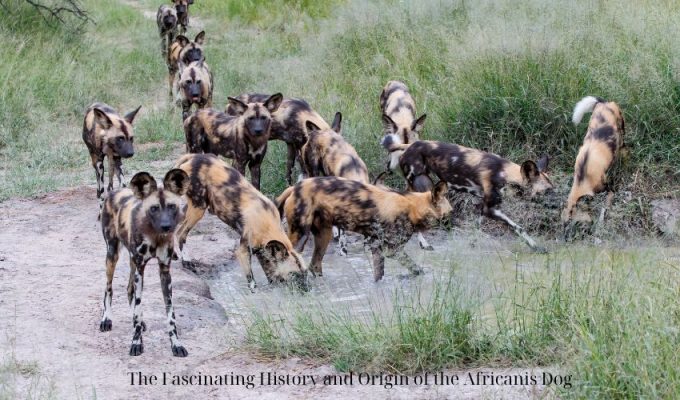Discover the intriguing history and origin of the Africanis dog, a unique and ancient breed with a fascinating story to tell.
Introduction to the Africanis Dog breed
The Africanis is a unique and special breed of dog that is part of Africa’s rich heritage and biodiversity. This breed is known for its intelligence, loyalty, and overall good health, making it an ideal pet for many families. Despite its many positive qualities, Africanis dogs are often abandoned or rescued from townships and rural areas, leading to a large number of them in need of homes.
The Africanis is a breed that has evolved naturally over time, unlike many Western dog breeds that have been artificially shaped by human standards. This natural selection has resulted in a healthy and functional breed that is valued for its usefulness and loyalty. With its origins dating back to ancient cave art and Egyptian murals, the Africanis has a long history in Africa and is found all over Southern Africa today.
The physical characteristics of the Africanis are simple and functional, with a medium size, slender build, and well-muscled body. The breed comes in a wide range of colors and may have markings or a ridge on its back. The dog’s coat adapts to the seasons and requires minimal grooming, making it a low-maintenance pet. Additionally, the Africanis is known for its agility, speed, and expressive face, embodying the beauty of simplicity in its build.
The Africanis Society was founded with the objective of protecting and preserving the Africanis as a native landrace. Through the work of experts and researchers, the breed has been recognized as a coherent and distinct breed of dog, with specific behavior and appearance. The society aims to raise awareness about the Africanis breed and ensure its continued preservation for future generations.

Ancient roots of the Africanis Dog
The Africanis dog has ancient roots that can be traced back to the earliest remains of the domesticated dog in Africa, which were found in the Nile delta and dated to 4,700 BC. The breed is descended from dogs depicted in ancient cave art and on Egyptian murals, showcasing its long history and connection to the African continent.
Historical Spread
The Africanis dog has a historical spread that is documented through archaeological findings. The earliest record of a domestic dog in South Africa dates back to 570 AD, and by 800 AD, the dog was found in a Khoisan settlement at Cape St Francis. This historical spread showcases the enduring presence of the Africanis breed in Southern Africa over centuries.
- 570 AD: Domestic dog found in South Africa
- 800 AD: Dog found in a Khoisan settlement at Cape St Francis
Distinct Physical Features
The Africanis dog is known for its distinct physical features, including a medium-sized, slender build, and well-muscled body. The breed is agile, supple, and can run at great speed. With a wide range of colors and variable physical features, the Africanis embodies the simplicity and functionality of its build, reflecting its adaptation to the environment over time.
Colonial influences on the Africanis Dog
The Africanis dog has been shaped by centuries of interaction with various colonial influences in Southern Africa. During the colonial period, European settlers brought their own breeds of dogs to the region, which inevitably interbred with the local Africanis dogs. This resulted in a diversification of the breed, with some dogs exhibiting characteristics of both Africanis and European breeds. The introduction of new diseases and parasites by colonial powers also had an impact on the health and resilience of the Africanis dog.
Impact on breeding and genetics
The colonial period saw the deliberate breeding of Africanis dogs with European breeds in an attempt to create dogs that were better suited for specific tasks, such as herding or guarding. This led to a dilution of the pure Africanis gene pool and the loss of some of the breed’s unique traits. Additionally, the introduction of European breeding standards and practices may have influenced the physical appearance and behavior of some Africanis dogs.
- Interbreeding with European breeds
- Loss of unique traits
- Influence on physical appearance and behavior
Health and environmental impact
Colonial influences also brought new diseases and parasites to the region, which had a significant impact on the health and survival of the Africanis dog. European dogs may have introduced diseases to which the Africanis had no natural immunity, leading to population declines and changes in the overall genetic diversity of the breed. Additionally, changes in land use and environmental conditions due to colonial activities may have affected the habitat and hunting grounds of the Africanis.
- Introduction of new diseases
- Population declines
- Changes in genetic diversity
- Impact on habitat and hunting grounds
Modern resurgence of the Africanis Dog
The modern resurgence of the Africanis dog has seen a renewed interest in this unique and special breed. With a growing awareness of the importance of preserving indigenous breeds, the Africanis has garnered attention from dog enthusiasts and organizations dedicated to animal welfare. This resurgence has led to increased efforts to protect and promote the breed, as well as initiatives to find loving homes for Africanis dogs in need.
The Africanis Society, founded by archaeologist Dr. Udo Küsel and dog behaviorist Johan Gallant, has played a key role in the modern resurgence of the Africanis dog. Through their research and advocacy, the Africanis Society has raised awareness about the historical and cultural significance of the breed, as well as its unique traits and characteristics. Their work has helped to highlight the value of the Africanis as a native landrace and promote its conservation and protection.
In addition to the efforts of organizations like the Africanis Society, the modern resurgence of the Africanis dog has also been fueled by the growing appreciation for the breed’s intelligence, loyalty, and resilience. As more people learn about the Africanis and its rich history, they are drawn to the breed’s unique qualities and the opportunity to provide a loving home for a dog with such a deep connection to Africa’s heritage. This renewed interest has led to an increase in adoptions and support for Africanis dogs, ensuring that they continue to thrive and contribute to the cultural tapestry of Southern Africa.
Lists
– Characteristics of the Africanis breed, including intelligence, loyalty, and resilience
– Historical and cultural significance of the Africanis as a native landrace
– Efforts of organizations like the Africanis Society in promoting the conservation and protection of the breed
– Increased adoptions and support for Africanis dogs in modern times
The modern resurgence of the Africanis dog is a testament to the enduring appeal and value of this unique breed. With a rich history, distinctive traits, and a growing community of supporters, the Africanis continues to captivate the hearts of dog lovers and advocates for indigenous breeds. As efforts to protect and preserve the Africanis gain momentum, the breed’s future looks brighter than ever.
Genetic studies and origins of the Africanis Dog
Genetic studies have shown that the Africanis dog is a unique and ancient breed, with a genetic makeup that sets it apart from other dog breeds. Researchers have found that the Africanis has a diverse genetic background, reflecting its long history and the natural selection process that has shaped the breed. These studies have also confirmed the Africanis’ close genetic relationship to the earliest domesticated dogs in Africa, as well as its distinctiveness from modern Western dog breeds.
Genetic Diversity
Studies of the Africanis dog’s genetic diversity have revealed a wide range of genetic variations within the breed. This diversity reflects the Africanis’ long history and the natural selection process that has shaped its genetic makeup. The genetic studies have also shown that the Africanis has a unique genetic profile that sets it apart from other dog breeds, making it a valuable and distinct part of Africa’s biodiversity.
Origins and Evolution
The origins and evolution of the Africanis dog can be traced back to ancient times, with evidence of its presence in Africa dating back thousands of years. Genetic studies have confirmed the Africanis’ close genetic relationship to the earliest domesticated dogs in Africa, as well as its distinctiveness from modern Western dog breeds. These studies have shed light on the breed’s evolution and its unique genetic makeup, highlighting its importance as a part of Africa’s heritage and biodiversity.
The Africanis Dog in contemporary society
The Africanis dog has become increasingly popular in contemporary society due to its unique heritage, loyalty, and low-maintenance nature. As more people become aware of the breed’s intelligence, agility, and natural resistance to parasites, there has been a growing interest in adopting Africanis dogs as pets. Their adaptability to different environments and their strong bond with their human families make them a sought-after companion in today’s society.
Protection and Preservation Efforts
The Africanis Society, founded in 1998, has played a crucial role in protecting and preserving the Africanis as a native landrace. Through research, documentation, and advocacy, the society has raised awareness about the importance of safeguarding this unique breed. Efforts to promote responsible ownership and adoption of Africanis dogs have also contributed to their increased presence in contemporary society.
– The Africanis Society has conducted extensive research to establish the breed’s distinct behavior and appearance.
– Advocacy efforts have focused on promoting responsible ownership and adoption of Africanis dogs.
– Preservation initiatives have aimed to maintain the breed’s natural resistance to parasites and overall robust health.
Popularity and Adoption
In recent years, the Africanis dog has gained popularity as a cherished pet in contemporary society. Their unique characteristics, including loyalty, intelligence, and low grooming requirements, have made them an attractive choice for many families and individuals. Adoption centers and animal welfare organizations have also played a significant role in promoting the adoption of Africanis dogs, highlighting their suitability as companions and their ability to thrive in various living environments.
– Africanis dogs are increasingly being recognized as ideal pets due to their loyalty, intelligence, and low grooming needs.
– Adoption centers and animal welfare organizations have actively promoted the adoption of Africanis dogs, contributing to their increased presence in contemporary society.
– The breed’s adaptability to different living environments has made them a popular choice for families and individuals seeking a loyal and low-maintenance companion.
Conservation and preservation of the Africanis Dog
The conservation and preservation of the Africanis Dog is crucial to safeguarding Africa’s unique heritage and biodiversity. This breed is a result of natural selection and has evolved to thrive in the harsh environmental conditions of Southern Africa. Efforts to protect and preserve the Africanis Dog are essential to ensure that this special breed continues to contribute to the rich cultural and ecological tapestry of the region.
Preservation Efforts
The Africanis Society, founded by archaeologist Dr. Udo Küsel and dog behaviorist Johan Gallant, has been at the forefront of preservation efforts for the Africanis Dog. Through research, documentation, and advocacy, the society aims to raise awareness about the value of the Africanis as a native landrace and promote its conservation. Additionally, partnerships with animal welfare organizations and educational initiatives are essential in ensuring the long-term preservation of this unique breed.
Conservation Challenges and Solutions
One of the main challenges in conserving the Africanis Dog is the abandonment and homelessness of these animals, particularly in townships and rural areas. To address this, initiatives focused on responsible pet ownership, adoption, and spaying/neutering programs are crucial. Furthermore, promoting the Africanis as an ideal pet through education and awareness campaigns can help increase adoption rates and reduce the number of homeless Africanis dogs. By addressing these challenges and implementing sustainable conservation strategies, the Africanis Dog can be safeguarded for future generations.
In conclusion, the Africanis dog is a unique and ancient breed that has evolved alongside humans in Africa for thousands of years. Its origin can be traced back to the indigenous dogs of the continent, making it a valuable and resilient breed with a rich heritage.




